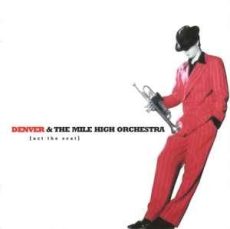
Daily Dose Of Jazz…
Louisa West was born in Thomasville, Georgia on June 14, 1979 and began playing flute at the age of ten. She went on to receive a Bachelor of Music Performance from the University of Georgia and while studying there she performed in numerous ensembles including an orchestra conducted by Sammy Nestico. She studied privately with classical flutists Angela Jones-Reus, William Bennett, Mary Karen Clardy, and Mimi Stillman, as well as jazz flutists Nestor Torres and Holly Hofmann.
A winner of numerous competitions, after graduating from college in 2001, she relocated to southern California where she has been performing in the musical genres of world music, jazz, Latin jazz, and classical music. Playing extensively in the U.S, Canada and Mexico, Louisa has appeared onstage with touring acts such as Persian pop star Shakila, flutist Nestor Torres, and Brazilian singer Diogo Nogueira.
West recently attended California Brazil Camp, where she delved into the history and music of Brazil through workshops and performances by Brazilian jazz artists. This experience inspired her 2010 debut release with Jimmy Patton titled Sambarina.
Flutist Louisa West continues to perform, tour and record.
More Posts: bandleader,flute,history,instrumental,jazz

Daily Dose Of Jazz…
Born in Quebec, Canada on June 5, 1980 pianist Chantale Gagné began studying music at the age of 8 and at fifteen she fulfilled her passion witht he piano. From 1997 to 1999 she studied jazz piano with James Gelfand at College Marie-Victorin in Montreal, Canada. Following this with four years at McGill University, she graduated with a degree in Jazz Piano Performance.
In 2005, Chantale met pianist Kenny Barron, studied with him and was inspired both as a pianist and composer of jazz. She has since been busy performing throughout Canada, United States. and Europe in trio, quartet, piano solo and big band configurations.
Silent Strength, is her self-produced debut trio album with bassist Peter Washington and drummer Lewis Nash featuring many of her original compositions. Garnering wonderful reviews it has received global radio play.
Gagné’s sophomore album, Wisdom Of The Water, released in 2010 adds a folk/heartland influence along with vibraphonist Joe Locke along with Washington and Nash. Her third album, The Left Side Of The Moon, has saxophonist Steve Wilson joining the resident rhythm team.
Pianist and composer Chantale Gagné, who has received the distinction Révélation Radio-Canada Musique 2008-09, continues to perform, record and tour.
More Posts: bandleader,composer,history,instrumental,jazz,music,piano

Daily Dose Of Jazz…
ELEW was born Eric Robert Lewis on May 13, 1973 in Camden, New Jersey where he studied piano as a child. Graduating from Overbrook High School in 1991, he received a full merit scholarship to the Manhattan School of Music. He graduated on the Dean’s List in 1995, then began touring.
Lewis began his career as a jazz purist, playing as a sideman for jazz artists like Wynton Marsalis, Cassandra Wilson, Elvin Jones, Jon Hendricks, and Roy Hargrove as well as performing as a member of the Lincoln Center Jazz Orchestra. Eventually becoming interested in rock music he embarked on a solo career as a crossover musician, quickly gaining recognition for his instrumental Rockjazz piano covers of mainstream rock hits like The Rolling Stones’ Paint It, Black and The Killers’ Mr. Brightside. He released his debut album of instrumental covers, titled ELEW Rockjazz Vol. 1, on his own label, Ninjazz Entertainment, in 2010.
Lewis became disillusioned with the jazz world after a solo record deal failed to materialize and struck out on his own to find success. It was around this time that he heard his first rock album, Linkin Park’s Meteora, which made a profound impression on his musical sensibilities. Taking the stage name ELEW, he adjusted his stage presence accordingly, growing an afro and adopting a distinctive style of dress, wearing armored vambraces over tailored suits. Discarding his piano bench for standing, he reached inside to grab the strings and beat on its wooden case like a percussion instrument.
Mainstream recognition came when he played a cover of Evanescence’s Going Under and an original composition, and was a featured speaker at the Long Beach TED Conference in 2009. He drew the interest of fashion designer Donna Karan, for whom he composed an original piece inspired by her fall 2009 collection and at her next New York City fashion show. That led to an invite by White House Social Secretary Desiree Rogers to play in the East Room for President Obama and the First Lady.
Pianist Eric Lewis, popularley known as ELEW, continues his journey of performing, composing, recording and touring.
More Posts: bandleader,history,instrumental,jazz,music,piano

Daily Dose Of Jazz…
David J. White was born May 3, 1968 in Houston, Texas and became a saxophone student at age eight. His love for jazz was nurtured by musicians and educators Conrad O. Johnson, Craig Green, and Dr. Robert Morgan. By the time he was sixteen he was playing with local bands in clubs and other musical events. While in high school he appeared in Saxophone Journal and other jazz education periodicals and won several awards including a DB award from DownBeat Magazine.
Moving to Washington, D.C. he attended Howard University and contributed to the Jazz Ensemble’s yearly recordings both as a performer and composer/producer. 1992 saw David meeting internationally renowned film maker Haile Gerima and composed, produced and performed the soundtrack for the critically acclaimed film Sankofa.
He went on to score other films and released his sophomore album on his own label titled Where I Left Off. This project represents a more aggressive style of composition and performance than his first release. He has performed with Rich Matheson, Billy Harper, Randy Brecker & Eliane Elias, and Lou Marini.
Tenor saxophonist David White continues to compose, perform, tour, produce and record.
More Posts: bandleader,composer,history,instrumental,jazz,music,producer,saxophone

Daily Dose Of Jazz…
Jared Ribble was born in Neenah, Wisconsin on May 2, 1979. Growing up in small town America proved the right landscape to cultivate a desire to play drums. His parents bought him his first drum set when he was nine and gave him weekly private lessons through high school graduation.
He went on to attend Belmont University-Nashville, Tennessee and graduated in 2001 where he studied Commercial Music-Percussion Performance, along with private instruction. Ribble went on to perform with trumpeter Phil Driscoll, Broadway artist Jonathan Pierce, singer/songwriter Byron Keith, Denver Bierman, lead singer and founder of Denver and the Mile High Orchestra.
Jared tours and records with the contemporary big band, Denver and the Mile High Orchestra. Holding down an extensive recording schedule in his On Digital Ground recording studio with the On Digital Ground Studio House Band. He composes for the music group Storyteller, and frequently plays on the worship team of Grace Pointe-Nashville.
He is also Vice-President of Reel Loud Records asked Jared to come on their executive staff as Vice-President. In this role he helps find, and promote the recording careers of innovative and talented artists.
Drummer Jared Ribble continues to move forward his career in touring, recording and business.
More Posts: bandleader,drums,history,instrumental,jazz,music



